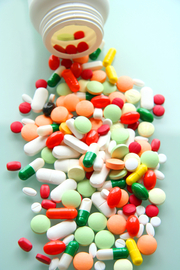Introduction

Find out the vitamins you really need not to get sick and be in top form
Vitamins: the secret of life.
The man who first realized this was Casimiro Funk, Polish biologist in the early nineteenth century found what their role is. Since then and until now have been discovered 14 vitamins, all essential for the body. Their role is to assist in the development of vital functions. They also have a role in slowing the aging processes caused by free radicals.
History
Vitamins are essential and they must be introduced into the body through a varied diet: you only need to eat a little of everything. But what about capsules vitamins? Gelatin is used in capsules vitamins, it is harmless, provides the necessary amount of protein and amino acids. Most capsules vitamins dissolve in matter of minutes in the stomach. Most of the capsules vitamins are made out of pork or bovine. Probably there are no best capsules vitamins out there because the best way to assimilate vitamins is to do it the old fashion way, eating healthy and balanced.
Features
Here is all you need to know about these precious allies of your health:
-Vitamin A or retinol.
Found in nature in two forms: retinol (animal) and beta-carotene, containing orange vegetables (carrots, apricots) and green leafy vegetables, which are converted by the body into vitamin A. But this is only partly: liver retains some of it, for cases where it really needs it. Because of this we have an average supply of vitamin A sufficient for two years. Note, however: alcohol and smoking reduce its absorption. Recommended daily intake is 700 micrograms for men and 600 women. During breastfeeding, the need for vitamin A increases to 1,000 micrograms.
Among the foods rich in vitamin A we can find: liver, eel, carrots. Dosed in micrograms contained in 100 grams of product: * Liver cow: 16,500 * Eel: 980 * Eggs: 225 * Carrot: 1148 * Watermelon: 189 * Spinach: 485 * Mozzarella: 219 * Apricots: 360 * Peaches: 27 * Parmesan: 373 * Whole milk: 37.
If vitamin A is missing from the body the risks are: reduced vision during night, decreased amount of tears and continuous dry eye sensation, and a decreased defense power of the immune system.
Excessive doses cause drowsiness, hair loss, headaches, muscle aches, liver aches and bones aches, and during pregnancy it increases the risk of miscarriage.
-Vitamin B1 or thiamine.
It is present in many foods, plants or animals, but in very low concentrations. Moreover, it is easily lost during cooking (boiling, frying) food and eliminated quickly by the body. Use your muscles for energy development.
It is useful for proper nervous system and heart functions. Helps regulating sugar metabolism. Stimulates appetite and promotes proper digestion.
Recommended daily intake is 1.2 milligrams per day for men and 0.9 for women.
Foods richest in Vitamin B1: pork, liver, whole grains, vegetables, lean meat and potatoes. Doses in milligrams contained in 100 g. / Product:
* Whole milk: 0.1 * Oranges and pineapples: 0.15 * Pork poor: 0.4
* Bread full: 2.5 * Ham weak: 0.9 * White bread: 0.12 * Calf liver: 0.15
* Eggs: 0.18 * Beef, veal low: 0.1 * Fish: 0.12 * Chicken: 0.1 * Potatoes: 0.15
If vitamin B1 is missing, it can cause digestive problems, loss of appetite, confusion, and nerve disorders, such as irritability, feeling nervous, jittery.
This vitamin is very toxic. However, in excess can cause headaches and palpitations.
-Vitamin B2 or riboflavin.
It is present in many foods, both vegetable and animal. Its properties are modified not by heat, but by light. For this reason the food should be stored in sealed containers of dark color, or at least protected from light.
Recommended daily intake for women is 1.3 and 1.8 milligrams per day for men.
Among the foods rich in vitamin B2: milk, cheese, eggs, lean meat, fish, cereals and vegetables. Doses in milligrams contained in 100 grams of product:
* Whole milk: 0.18 * Eggs: 0.38 * Spinach: 0.35 * Parmesan: 0.15 * Broccoli: 0.23
* Mozzarella: 0.3 * White Bread: 0.1 * Calf liver: 2.36 * Bread full: 0.15 * Chicken livers: 1.36 * Beans: 0.30 * Veal low: 0.2
When the vitamin is missing from the body, you have the feeling of dry lips, red and inflamed eyes, conjunctivitis, mild anemia, inflammation of the lining of the mouth and skin (dermatitis).
In excess, no toxic effects are shown and it is easily removed from the body via urine, which in this case, gets a bright-yellow color.
Vitamin PP or niacin
PP logo derives from the fact that this vitamin is able to prevent pellagra, a disease widespread in the past and caused by a diet rich in corn and low in protein. Niacin is present mainly in foods of animal origin. It is necessary for cell respiration, which gives them a way to procure energy.
The recommended amount is 14 milligrams per day for women and 19 men.
Foods richest in vitamin PP: liver, lean meat, fish, vegetables, potatoes, cereals and dried fruit. Doses in milligrams contained in 100 grams of product:
* Calf liver: 13.8 * Full meal: 6 * Chicken: 6.8 * White flour: 1.8 * Veal: 6.7 * Peanuts: 17.1 * Avocados: 1.6 * Peas: 2.1 * Potatoes: 1.8
Symptoms of deficiency: general physical fatigue, redness (dermatitis), diarrhea. It has neurological conditions, reductions of good mood that can lead to depression. Abuse integrators of niacin can cause flushing, gastrointestinal discomfort and liver problems.